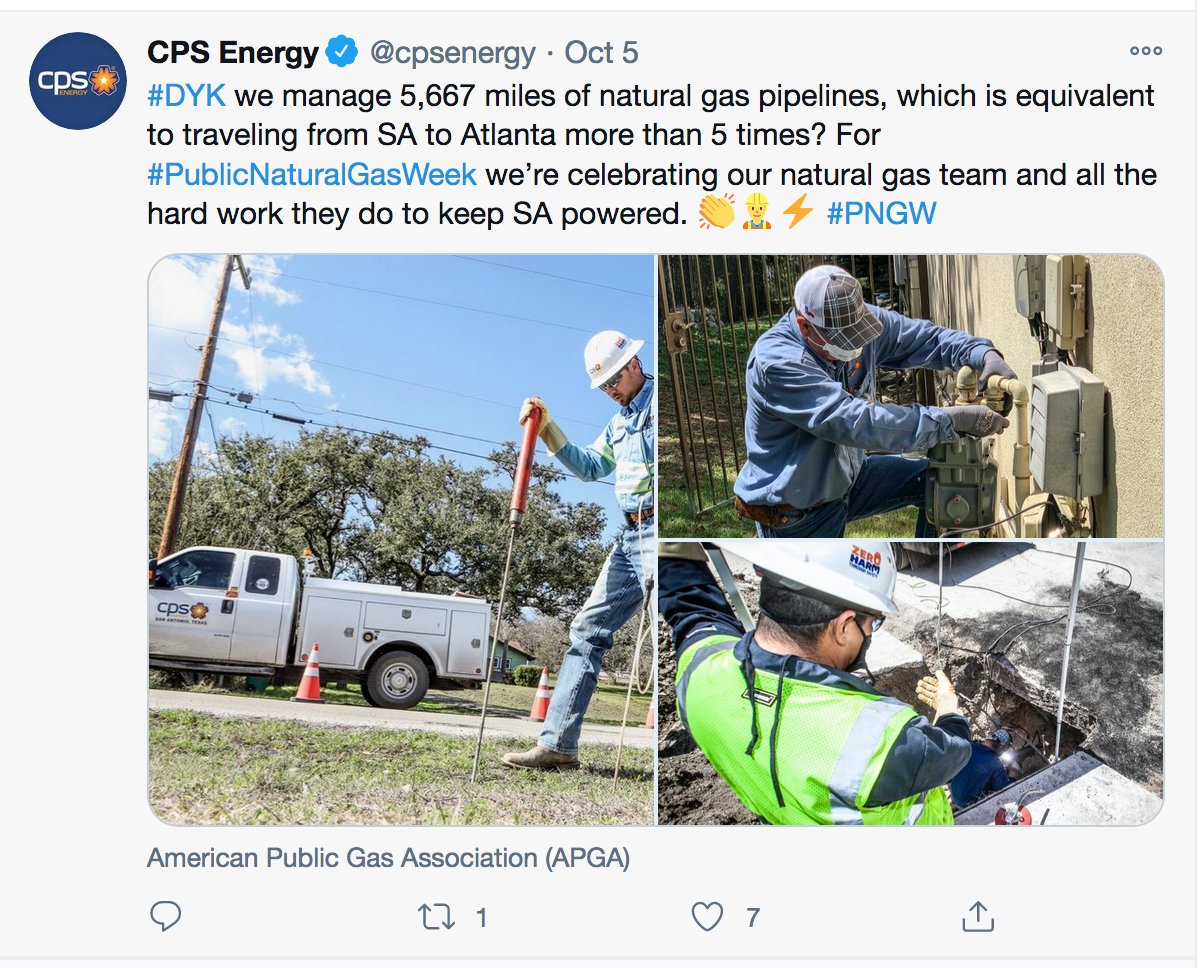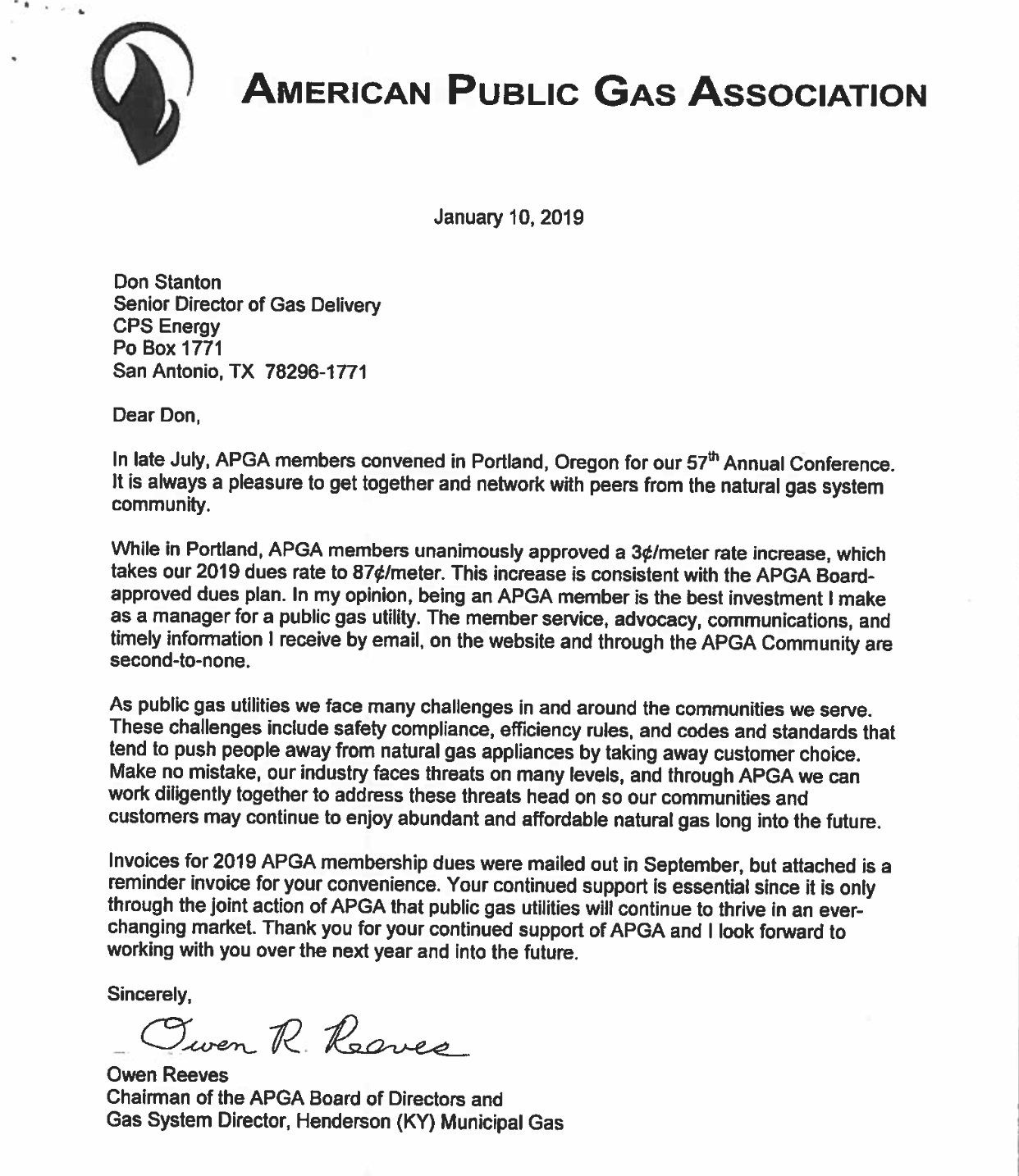Deep in the heart of Texas, by far the nation’s top oil producer, the city of San Antonio is starting to grapple with its reliance on fossil fuels.
But the key player in implementing the Alamo City’s energy transition — the local energy utility CPS Energy — remains committed to carbon-based fuels like coal and natural gas, even while it begins to invest more in renewable alternatives. Climate and clean energy advocates in the community have become fed up with the city-owned utility, which is not only stalling in efforts to phase out its fossil fuel portfolio, but is actively funding two gas industry trade associations to the tune of a quarter of a million dollars each year.
According to records obtained by the watchdog Climate Investigations Center and shared with DeSmog, CPS Energy pays over $50,000 in annual membership fees to the American Public Gas Association (APGA), and over $200,000 annually in membership dues to the American Gas Association (AGA). Both groups lobby for continued dependence on methane gas, such as direct use of gas in buildings for things like heating and cooking, and oppose efforts to slash emissions by electrifying sectors like buildings and transportation. Their members and sponsors include large energy utilities and pipeline and fossil fuel companies like Duke Energy, Enbridge, TransCanada, and BP.
As DeSmog previously reported in this “Unplugged” series, the California city of Palo Alto is also helping to fund the American Public Gas Association via membership dues amounting to over $20,000 annually and which are paid by the city’s municipally owned utility. Some in the community said they see this funding as a conflict with Palo Alto’s ambitious climate goals.
Similarly, several environmental activists from the community in San Antonio told DeSmog that their municipal utility’s funding and support for the methane gas lobby does not seem to square with San Antonio’s goal, prescribed in a new city climate plan, to reduce the city’s carbon emissions to net zero by 2050.
“To have a goal of being carbon neutral by 2050, while at the same time paying money to a gas association whose primary goal is to keep us hooked on fossil fuels, yeah, absolutely that’s a conflict,” said DeeDee Belmares, a San Antonio resident and climate justice organizer with the nonprofit organization Public Citizen.
Russell Seal, a fellow San Antonio resident and volunteer with his local chapter of the Sierra Club, said it was “no surprise” to learn that CPS Energy is a member of these gas lobby groups, and that the utility seems determined to include gas as essential to meeting the city’s climate targets.
“We have a climate action plan that has natural gas in it,” Seal said. “CPS says we’re not going to live without gas.” He said CPS Energy has previously defended its position on methane gas by telling one clean energy advocate that the energy utility “is a gas company too.”
Screen shot of CPS Energy Tweet, from October 5, 2020, celebrating its gas service and tagging the American Public Gas Association.
CPS Energy and Natural Gas
CPS Energy is indeed in the gas business. As the nation’s largest municipally owned energy utility, San Antonio’s CPS Energy provides both electric and natural gas service to residents of the seventh-largest city in the country. The utility says it serves over 840,750 electric customers and more than 352,585 natural gas customers.
It describes gas on its website as “an environmentally friendly, abundant fuel source.” That language is precisely the way the gas industry markets this fuel. This framing obscures the fact that so-called “natural gas” is composed almost entirely of the potent greenhouse gas methane, which inevitably leaks throughout the gas production and distribution system, adding dangerous climate pollution to the rapidly warming atmosphere.
On its website, the San Antonio utility asserts that fossil fuels, or what it calls “traditional generation assets,” remain an “important bridge to the future to ensure value and reliability to our customers.”
Screen shot of CPS Energy’s January 6, 2020 letter to environmental stakeholders describing the utility’s position on natural gas.
According to CPS Energy, the utility operates 15 gas-burning units and over 5,500 miles of gas distribution lines. CPS describes methane gas as an “important part” of its product portfolio — the fossil fuel makes up almost half (45.4 percent) of the utility’s generating capacity. This amount has increased by 18 percent between 2010 and 2018, meaning gas has played a growing role in the utility’s portfolio. And even under one CPS planning scenario that envisions a much larger integration of renewable energy, gas and coal power together comprise at least 20 percent of the utility’s generation by 2040.
CPS Energy even offers rebates for customers who install gas appliances in their homes, and for customers who swap out electric appliances for ones that burn gas. San Antonio’s city-owned utility claims that direct use of gas in homes is much more efficient compared to electric uses — a claim that is disputed by many energy policy experts, such as those at the nonprofit Rocky Mountain Institute, but nevertheless touted by gas industry trade associations like AGA and APGA.
One spokesperson from Rocky Mountain Institute — a Colorado-based energy and sustainability research center — explained that newer electrical-based heating technologies like heat pumps are actually more efficient than their gas counterparts. “Air source and ground source heat pumps are significantly more efficient than gas devices,” said Sherri Billimoria, a senior associate at Rocky Mountain Institute. “Heat pumps use electricity to harness energy from the surrounding air or deep in the ground and pump that energy indoors in the form of heat — much like an air conditioner in reverse. These systems can achieve efficiencies three to six times higher than conventional heating technologies like gas furnaces.” She said these new heating technologies “can provide carbon and cost savings” and that “we should instead be incentivizing customers to switch from gas furnaces to heat pumps.”
CPS Energy spokesperson Seamus Nelson offered a different view, claiming that methane gas “is an efficient energy choice for home heating and for heat-generating appliances” and helps lower carbon emissions. According to Nelson, who serves as corporate communications manager, neither the AGA nor APGA has played a role in the gas rebates that CPS Energy offers.
Nelson said the utility’s fiduciary duty to provide reliable energy “is aligned to the sentiments of American Gas Association and the American Public Gas Association,” and he did not deny that the utility gets talking points from gas industry trade associations.
“We do receive information from many organizations, including those focused on the benefits of renewable energy, and use our discretion and expertise when making an independent decision on what information to share through CPS Energy channels,” Nelson said.
Paying for Memberships in Gas Lobby Groups
CPS Energy is an active member of both the American Gas Association and American Public Gas Association. According to invoice records obtained through public records requests by the Climate Investigations Center and shared with DeSmog, AGA billed CPS Energy $226,345 for membership dues in 2018, and billed CPS $234,018 for dues in 2019. Records show that CPS Energy’s membership dues to APGA totaled $54,000 in 2018 and $56,000 in 2019. Taken together, CPS Energy is paying over $250,000 per year for membership in these two groups that lobby for the interests of gas utilities and the larger gas industry.
An APGA cover letter attached to the 2019 invoice to CPS Energy indicates that membership value in the association includes services such as advocacy and communications. As APGA explained in response to a DeSmog inquiry, the public gas trade association “provides a number of services to its members, ranging from education and advocacy to assistance on operations and safety … Additionally, as the only trade association that solely represents the interests of public gas systems at the legislative and regulatory level, APGA advocates for legislative and regulatory policy priorities established by its members and educates policymakers about the interests and concerns that impact the operations of public gas systems.”
Screen shot of APGA cover letter addressed to CPS Energy
DeeDee Belmares, the local climate justice organizer, told DeSmog it is “terribly concerning” that CPS Energy is spending such a substantial amount annually on gas trade association memberships.
“What do they get from that? What are the benefits to the community when they spend a quarter of a million dollars a year to stay on natural gas? That might explain why they don’t want to move away from fossil fuels,” she said.
“The fact that the utility stays engaged with groups like that, that they’re not trying to make a just transition, it’s not flattering,” added Greg Harman, a San Antonio resident and clean energy organizer with the Sierra Club’s Alamo Group.
San Antonio’s Climate Plan and Recall CPS Petition
In October 2019, the San Antonio City Council adopted a Climate Action and Adaptation Plan, which includes the goal for the city to become carbon neutral by 2050, along with interim targets to reduce citywide greenhouse gas emissions by 41 percent by 2030 and 71 percent by 2040. The plan does not mandate cuts in fossil fuel usage and, as Harman explained, it outlines suggestions — like reducing energy consumption in buildings and sourcing more electricity from renewable sources — rather than legally binding measures.
“The climate plan is mainly just recommendations,” he said. He also added that CPS Energy was heavily involved in the plan’s development, influencing the final version and offering to pay for the plan.
“And they made sure language that would have forced them to abandon fossil fuels by 2050 was erased,” Harman wrote in an October 23, 2019 post reacting to the city council’s passage of the plan.
According to Seamus Nelson, the CPS Energy spokesperson, the utility was not the sole financial contributor to San Antonio’s climate plan, but “did provide about $778,000 in helpful funds to underwrite the report.”
A key area of contention between community activists and CPS Energy is the utility’s continued operation of a coal-fired power plant. The J.K. Spruce coal plant produces 1,300 megawatts of electricity and is the largest polluter and emitter of globe-warming gases in the San Antonio area. According to CPS Energy, coal power comprises 18.3 percent of the utility’s generating capacity.
Belmares told DeSmog that, given this large emitter, CPS Energy should be working with the community and the city to sunset the coal plant to meet the city’s climate goals.
“We need them committed as a utility [to the energy transition], they need to be probably the most committed partner in the [climate] plan, seeing as their coal plant contributes to half the carbon pollution in San Antonio,” she said.
This commitment has not happened, and so progressive activists in the community have launched a “Recall CPS” petition to hold the utility accountable by removing the CPS Energy board of trustees and putting city council in charge of oversight.
“CPS Energy has not worked with us,” Belmares, lead organizer of the petition, said, referring to community members’ requests that the utility abandon coal, integrate more sustainable energy, and work on a fairer rate structure.
The Recall CPS Energy Petition calls for reorganizing the utility as a department of the city. The mayor and city council would govern the utility rather than an unelected board; the petition would also put CPS Energy on a path to close the Spruce coal plant by 2030 and commit to a “fair rate structure,” which involves more transparency and citizen input and requires the utility to incorporate energy efficiency and conservation measures, as opposed to selling more energy to boost profits. The petition aims to get at least 20,000 signatures in order to be put on the municipal ballot, in the form of a charter amendment, in May 2021.
DeSmog has reached out to San Antonio City Council and the City of San Antonio’s chief sustainability officer about this proposal but did not receive responses in time for publication.
‘We Expect Better Behavior From the Utility That We Own’
Natural gas pipes in a parking garage in Rivercenter Mall in San Antonio. Credit: Wil C. Fry, CC BY–NC–ND 2.0
The petition reflects the sense that at least some members of the San Antonio community feel betrayed by their own taxpayer-funded energy utility. Several local activists told DeSmog that CPS Energy has failed to come to terms with the severity of the climate crisis and that the utility seems particularly cozy with fossil fuel and big business interests.
“I feel jaded with CPS Energy,” said Russell Seal. “They view themselves as a business that just happens to be owned by the city.”
“In San Antonio we expect better behavior from the utility that we own,” Greg Harman said. “As owners of the utility, the people of San Antonio are continually sidelined, marginalized, dismissed. We’re still waiting for a utility that recognizes the existential crisis that we’re in, that recognizes that in one of the poorest large cities in the country, one of the most economically and racially segregated cities in the country, a city that is struggling to breathe, that this is real, that people matter, that they have an obligation to come to the table as partners.”
Although CPS seems to admit on its website that climate change is real, Belmares contends that “CPS has never acknowledged there’s a climate crisis.” She added: “It’s so concerning that they’ve got deep ties to the [fossil fuel] industry, and it just shows how uncommitted they are to putting San Antonio onto the road of clean renewable energy.”
These residents say they hope this starts to change under new national leadership from the incoming Biden administration. President-elect Joe Biden has stated that he will strive to put America on a path towards a carbon-free electric power sector by 2035, for example.
“CPS Energy sees the writing on the wall,” Belmares said, referring to the way the incoming Biden administration has been talking about addressing the climate crisis. “[CPS] should have been planning for this [energy transition] years ago.”
Seal agreed, saying he hopes that the Biden administration will help communities like theirs push their utilities away from the polluting energy sources that are fueling climate breakdown. “Hopefully we’re going to get some better direction from the Biden administration,” Seal said.
Check out the DeSmog investigative series, Unplugged: The Gas Industry Is Fighting Efforts to ‘Electrify Everything’
Main image: Sunrise in San Antonio. Credit: Jonathan Cutrer, CC BY–NC 2.0
Subscribe to our newsletter
Stay up to date with DeSmog news and alerts











